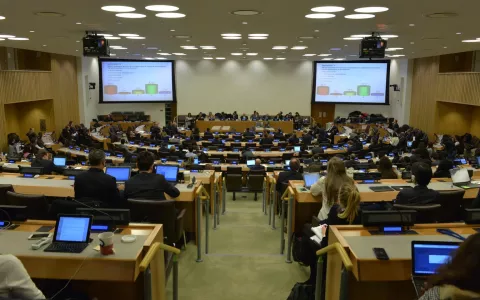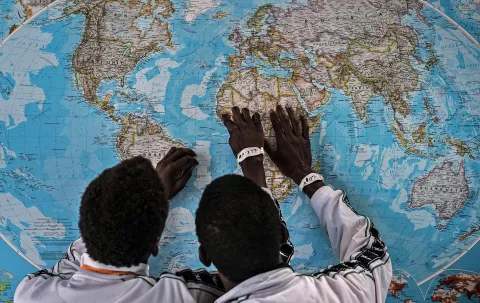UNICEF Executive Board: Responding to COVID-19 while securing long-term results for children
First regular session of 2021

NEW YORK, United States of America, 15 February 2021 ─ The UNICEF Executive Board ended its first regular session for 2021 last Friday. During the session, the Board discussed topics ranging from adapting the organization to meet new challenges, to promoting universal access to quality health care, while calling for accelerated progress towards achievement of the Sustainable Development Goals (SDGs). Threading through many of deliberations was the UNICEF emergency response to COVID-19 and the organization’s work to recover and rebuild better to achieve long-term results for every child.
In her remarks at the start of the session last Tuesday morning, Executive Board President, H.E. Ms. Audra Plepytė, Permanent Representative of Lithuania to the United Nations, emphasized the impact of the COVID-19 pandemic on children, as well as the need to ensure equal opportunities for learning and for serious, sustained attention to enabling progress for girls. “We must commit to getting back on the track to achieving the child-related Sustainable Development Goals. The world’s children cannot wait for the end of the pandemic to see the progress,” she said.
UNICEF Executive Director Henrietta H. Fore echoed Ambassador Plepytė’s sentiments with a call to accelerate progress towards the SDGs now, in the crucial first half of the Decade of Action. To meet new challenges triggered by the pandemic and achieve both immediate and long-term results for children, Executive Director Fore also highlighted the importance of adapting to changing needs: As UNICEF marks its 75th anniversary this year, she said, it is “an opportunity to continue changing and adapting our UNICEF for the future.”
COVID-19: Responding to a global emergency…
High on the Board’s agenda for the session were discussions about the impact of the COVID-19 pandemic on children, and the UNICEF response. The pandemic has triggered an unprecedented global health, humanitarian, socioeconomic and human rights crisis that has spread across the globe – with dramatic effects on children.
But, as Executive Director Fore reminded Board Members, UNICEF is working hard in this time of great need. So far, working through partners, UNICEF has reached 3 billion people with life-saving messages to reduce COVID-19 transmission and mortality; supported 301 million children with remote learning; provided nearly 74 million vulnerable people with vital supplies like soap and hygiene kits; and trained 3.3 million health workers in infection prevention and control.
Dr. Tedros Adhanom Ghebreyesus, Director-General of the World Health Organization, addressed the Executive Board during its discussion on COVID-19. “There is no vaccine for climate change, poverty or malnutrition,” he said. Acknowledging the strong partnership between WHO and UNICEF, Dr. Tedros noted that “neither of us could do what we do without the other,” and went on to cite the vital role of UNICEF in procuring vaccines and preparing countries to deploy them rapidly once received. He said “through the Access to COVID-19 Tools Accelerator and COVAX, we are poised for the largest vaccination campaign in history.”

UNICEF’s response to COVID-19 has been guided by four strategic priorities: supporting the public health response to reduce coronavirus transmission and mortality; responding to the immediate socioeconomic impacts through continuity of basic services; advocating for child rights; and facilitating access to the COVID-19 Tools (ACT) Accelerator partnership.
This long view – and a holistic, multisectoral view – is critical, because COVID-19 has shed a light on the multiple forms of exclusion faced by the most marginalized and vulnerable groups. This exclusion existed prior to the pandemic and will persist beyond it if efforts are not accelerated.
…while building for the future
UNICEF’s response to the new challenges posed by the COVID-19 pandemic have highlighted the need to adapt and innovate – by strategically incorporating lessons learned into action plans, or by setting new trends with innovative partnerships.
Focused on long-term progress for children, UNICEF is integrating lessons from the past, including from the pandemic, into its new Strategic Plan, 2022–2025, so that it can work more efficiently and accelerate action towards the SDGs, including in health.
During the session, the Board adopted the 2021 workplan and budget for UNICEF private fundraising and partnerships. Linked to this, an innovate financing tool developed in partnership with the World Bank was endorsed as a pilot initiative to raise additional financing for investment in private sector fundraising. This marks the first time a financial instrument of this type was initiated by a United Nations organization.
New country programmes
On Thursday, the presentation of the new country programme documents approved by the Board focused on a cross-cutting theme: the global challenge to recover the health gains hindered by the COVID-19 pandemic. The agenda item included presentations by four guest panellists, as well as UNICEF experts and leaders.
Speakers discussed the importance of continuing to strive for universal access to quality health care; the impact of COVID-19 on health systems; and how to overcome the new challenges posed by the current pandemic to achieve the SDGs, with a particular focus on health.

Mr. Omar Abdi, UNICEF Deputy Executive Director, Programmes, introduced the item and reiterated that, with less than 10 years to meet the goal of universal health care, primary health care remained the best pathway to accelerate progress towards Sustainable Development Goal 3.
The role of family doctors on the front lines of the country’s response to COVID-19 was noted by His Excellency Dr. Venko Filipče, Minister of Health, North Macedonia, one of four panellists who shared video remarks for the event. Also in pre-recorded video remarks, Her Excellency Ms. Nialé Kaba, Minister of Planning and Development, Côte d’Ivoire, said that the country’s development plan for 2021–2025 would incorporate digital innovations introduced during the pandemic to reach each mother and each child with primary health care services.
Miss Khadija Djarraya, a Girl Scout Leader with the Tunisian Scouts, turned the spotlight on how young people are helping to address the COVID-19 pandemic in her country. The Tunisian Scouts has launched handwashing campaigns, put up fliers and took temperatures at schools to help their country’s response to the pandemic. She reported that 12,000 active volunteers had worked more than 2 million hours to support the government’s COVID-19 response. Mr. Adam Abdelmoula, Deputy Special Representative of the Secretary-General, Resident and Humanitarian Coordinator, United Nations Assistance Mission in Somalia, also stated in his recorded remarks that, critical to Somalia development was investment in the future of children, and crucial to this was improving maternal and child health, with a focus on geographical inequities to reach every mother and child.

2021 Regular session: Key decisions
The Executive Board adopted five decisions, including the approval of 11 new country programmes for Azerbaijan, China, Côte d’Ivoire, Eswatini, Georgia, North Macedonia, Panama, Somalia, Tunisia, Uruguay and Uzbekistan; the extensions of several ongoing country programmes; the private fundraising and partnerships workplan and budget, including authorization to executive the financial instrument with the World Bank as a pilot project and endorsement of a revolving fund; the 2019 UNICEF financial report audited financial statements and report of the Board of Auditors and management response; and two evaluation reports and management responses.
In her concluding remarks, Executive Director Fore expressed her appreciation to the Executive Board. “Because of your support, advice and guidance, UNICEF staff members are standing with children through the pandemic and as their communities and countries recover stronger,” she said.
Ambassador Plepytė’s closing statement followed the screening of brief video tribute to the UNICEF staff from United Nations Secretary-General António Guterres. She stated: “I am optimistic for children, because I have, during the course of our meetings, heard from directors, managers, experts and delegates who are unrelenting in their quest for excellence in what they do, because they do it to improve children’s lives.”
***
The Executive Board will meet for its 2021 annual session from 1 to 4 June 2021.




